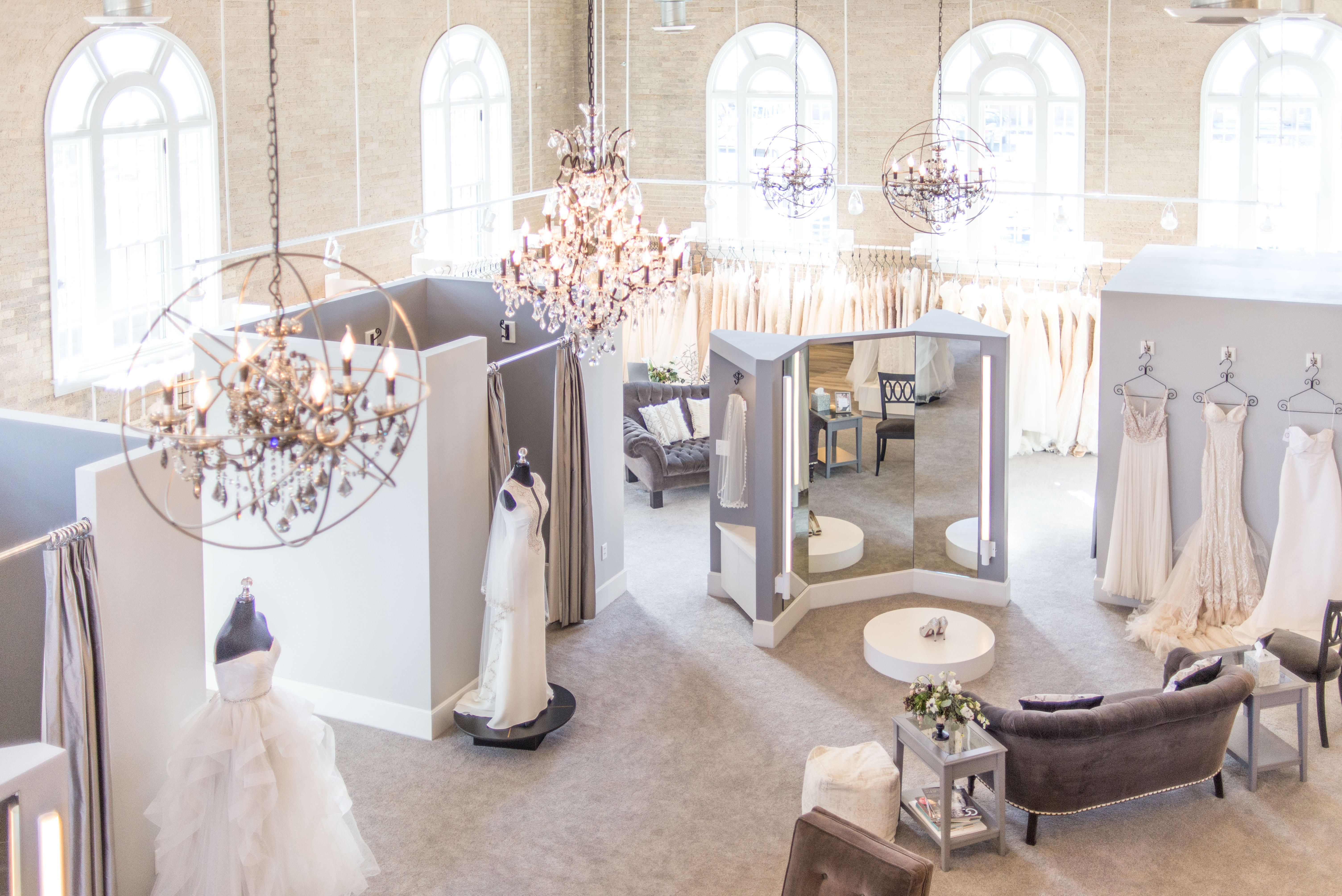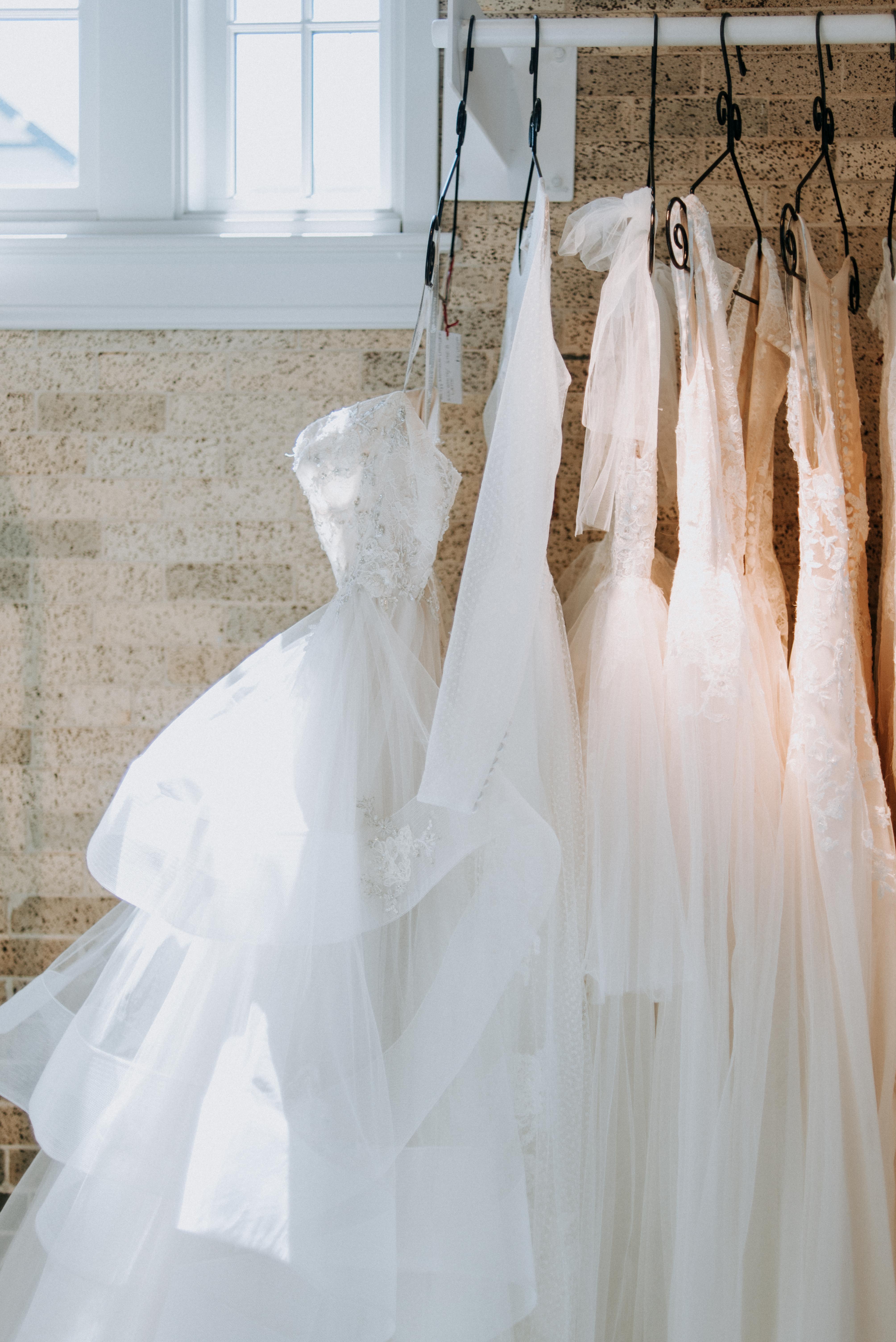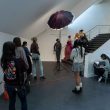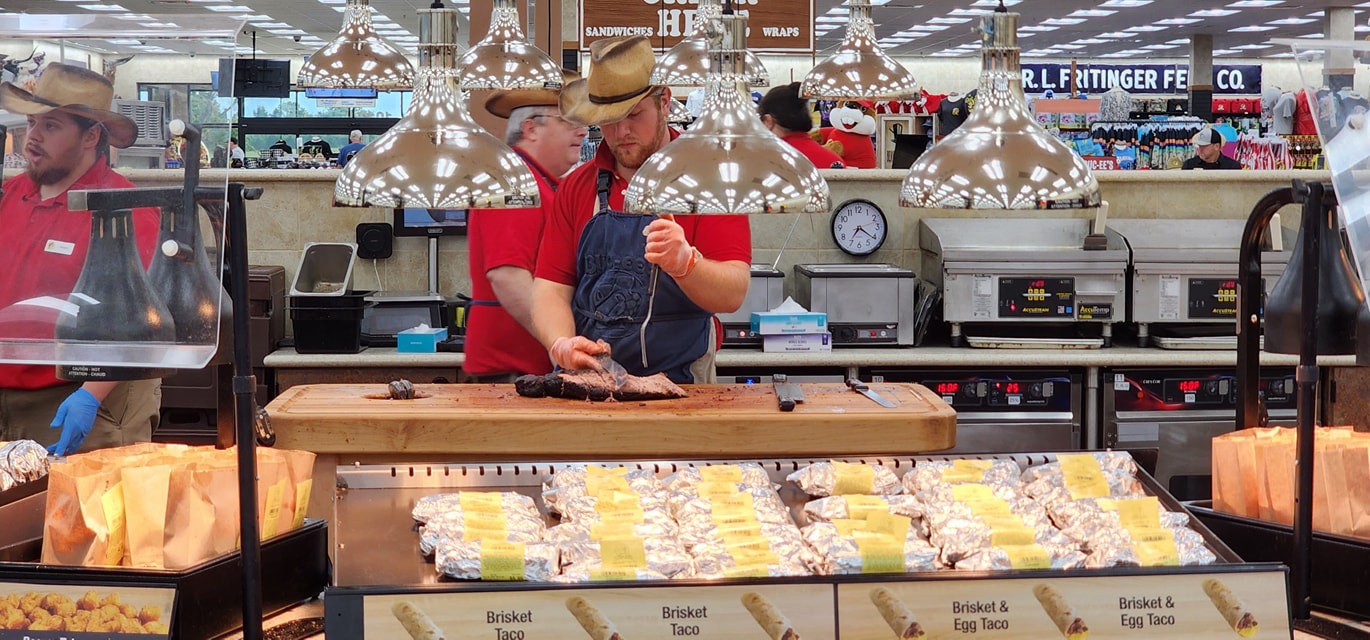Like so many industries over the past year, the wedding industry (and specifically wedding attire) has taken a significant hit. A sharp decline in the number of weddings taking place over the last year meant fewer brides shopping for dresses, which meant less demand and less inventory to choose from. Local bridal shops like Emma & Grace Bridal Studio, Little White Dress Bridal Shop and Lovely Bride, were required to take the steps necessary to keep everyone safe while making lasting changes to their businesses.
2021 is looking brighter for many bridal shops around Denver, but many of the precautions these shops were forced to take over the past year, will stick around for some time. And while some of these changes may impact the bride’s overall experience, the goal of these wedding industry businesses is the same: to try to make the experience as “normal” as possible and a special experience for everyone.
For those planning a wedding and looking to shop for a wedding dress or accessories around Denver, it’s important to know what you’re in for. We spoke to several business owners, managers and founders, to learn more about what to expect when shopping for “the” dress in the Mile High City. Additionally, we discussed what precautions businesses are taking as weddings begin to ramp up for the season.
Business Impact

Wedding cancelations and postponements have had a trickle down effect on the industry as a whole, as well as caused a lot of uncertainty. Venues are beginning to open up, with changing and limited capacities and as a result, couples have a hard time planning accordingly. As Kirsten Johnson, Manager of Emma & Grace Bridal Studio in RiNo explained, “so many of our brides have had to plan, reschedule, plan, reschedule, plan, reschedule that a lot of them have decided to have intimate elopements, and have a party when it is safe for their friends and family to come.” Despite the uncertainty, however, there are some positive outcomes. “Although this change is so hard, we have heard so many beautiful stories from our brides about how special the elopement was even though it was different than what they initially planned,” said Johnson.
Much like changes in capacity at wedding venues, bridal shops have had to change their capacities in store, as well as requiring face masks during appointments. As a result of the capacity restrictions, most shops can only allow up to two guests per bride during appointments. While on its surface, “it’s been a bummer, but most brides are understanding, and many have even preferred the less is more approach. Face masks can put a whole damper on the experience as well. It’s all been such a change, but we are so grateful how understanding our brides and their guests have been,” said Carly Rowader, Owner of Lovely Bride in RiNo.
With many weddings canceled or postponed in 2020, and other couples eloping or opting for non-traditional wedding celebrations, it’s safe to say there was not a huge market for wedding dresses over the past year. As a result, many shops saw an “overall decrease in appointments” said Rowader. A decline in appointments also meant a decrease in wedding dress inventory. “Within the bridal gown industry, designers have reduced the number of new styles that are designed and produced during the Covid-19 pandemic”, said Cate Carpenter, owner and founder of Little White Dress Bridal Shop in Five Points. She went on to explain that previously, designers may create two new collections every year, with over twenty gowns in each collection. Now, the trend is leaning toward one collection a year with around 10 gowns in the collection. But, there are some positives as a result, as the “reduced number of new dresses is also less of an environmental impact on our planet. I would like designers to continue this perspective and approach long after the pandemic is behind us,” Carpenter said.
With this impact to the wedding gown industry, brides should update their timelines accordingly. Not only can delays and shutdowns occur, but because so many 2020 brides postponed their weddings, they also postponed their alteration appointments. As a result, bridal alterations companies are anticipating almost double the amount of alteration requests this upcoming summer and fall. Brides should plan on receiving their dress about four months prior to their wedding date, to allow for plenty of time for alterations. Rowader’s advice for brides is to, “give yourself one month of dedicated and intentional appointments, and pull the trigger when you find the one. We simply don’t have the luxury to spread out the dress shopping experience for months anymore.” Luckily, many designers have rush options, so if a bride’s timeline is a bit shorter, there are options. “Let’s talk it out. I promise we have a solution for you,” said Rowader.
Safety Precautions in Store

Despite the uncertainty as a result of the pandemic, local bridal shops have updated their safety policies for their guests and staff. Many of these changes are temporary, but over the past year, have impacted the overall experience in store.
At Lovely Bride, not only are masks required during appointments, but the shop has built in “buffers” between appointment times, to ensure thorough cleaning procedures can take place. Additionally, guests are asked to wash their hands upon entering the shop for their appointment. Lovely Bride is also structured to allow appointments to take place socially-distanced: each bride gets their own suite to try on dresses, complete with full-length mirrors and ample space.
Not only does Little White Dress Bridal Shop require masks and temperature checks for anyone coming in for an appointment, they have even made upgrades to the structure of the shop itself. They’ve upgraded their HVAC ventilation system to include stronger air purification functions, in addition to frequently cleaning and sanitizing all surfaces and dresses.
Another change many shops have made is asking brides not to browse the dress gallery during their appointment, and allow the employees to do the “shopping.” Emma and Grace Bridal, along with several other bridal shops, send out pre-appointment questionnaires to their brides. This way, the shop can get an idea of what brides are looking for, who’s attending the appointment with them and begin to pre-shop for the bride, even before the appointment begins. Though this trend may have started as a result of COVID-19, it allows the shops to be more efficient and help a bride figure out what she’s looking for, even before her appointment begins. “We love pictures,” said Johnson “so make sure to check out our website or Instagram and send us pictures you love! This helps us pull better dresses and find you to the one!”
Lovely Bride schedules consultation calls before a bride’s first appointment to get a better understanding of what a bride is looking for. The shop also lists their real-time inventory on their website, so brides can create a “wishlist” of dresses they’d like to try on during their appointment. Brides can even filter by designer and price range. Rowader is proud of this transparency, and explained, “it’s honestly the first interactive bridal shop inventory of its kind, and I know Lovely Bride is leading the charge in this kind of transparency.”
Getting Creative

Once shops had to shut their shops for some time, change their policies and restrict or cancel events, they had to get creative. Shops have started virtual try-on appointments, Instagram trunk shows and relying on technology to move their business forward.
Lovely Bride in RiNo created a completely virtual offering for their brides, in the form of at-home try-on appointments. First, the team holds in-depth phone consultations to learn about the bride, their wedding dress style and body type and eventually narrow down to one or two dresses. Then, they schedule a day with their brides, when the dresses can be dropped off curbside, and a Lovely Bride staff member joins the bride via Zoom.
Johnson, Emma and Grace Bridal’s Studio Manager, noted that Instagram trunk shows and virtual try-on appointments have worked well for them over the past year. These virtual events allowed brides to continue their planning process over the past year, even if COVID-19 was preventing them from being able to come in for an appointment.
In August of last year, a new mobile app launched that uses AI technology to allow shoppers to choose, design, virtually try on and purchase engagement rings. The app, called Engage, was founded by local jeweler and Chairman of Hyde Park Jewelers, Michael Pollack. The app’s launch came at a perfect time, as stay-at-home orders continued and customers needed a new way to shop for wedding and engagement rings. Engage allows the customer to curate every element in the process, from band and metal, to diamond shape, size and clarity. Additionally, all Engage diamonds are ethically sourced and conflict-free. The app’s proprietary technology uses AI to learn the preferences of the individual user and make recommendations based on their selections. Customers can even connect to their Pinterest account, allowing the app to develop smart recommendations, showcasing ring band and diamond options to match the shoppers profile. And, in a world of swiping left and right, Engage has incorporated this all-to-familiar experience, to allow customers to swipe right on their favorites. With Engage, customers can feel assured that they’re getting the most competitive price. Pricing is always adjusted to be competitive in the marketplace, lessening the need for price comparison shopping, with real-time market data built into the platform.
Arvada jewelry store, Balefire Goods, is no stranger to virtual appointments, but have seen a steep increase in these types of appointments over the past year. For customers that prefer to be more cautious during this time, Balefire Goods owner and founder Jamie Hollier and her staff have been safely making house calls to pick up family jewelry to create custom pieces. While it’s been great to be able to offer these services, “this all means that some of our couples have never even been to our gallery in person,” explained Hollier. “It is an interesting experience to build a close bond with people while working on one of the most important milestones and symbols in their life without sharing physical space with them,” she described. Despite this new type of customer service, this proved to Hollier that “building rapport can be done in a lot of different ways and we are learning a ton that helps us provide improved service for both our local couples and the ones in other states or other countries.”
The Diamond Reserve owner and founder, Kaeleigh Testwuide, also relied heavily on virtual appointments over the past year, which helped her business stay afloat and allowed her to reach even out-of-state customers. The pandemic also inspired her to launch e-commerce, which was “a big undertaking, but has helped us grow our sales within and outside the Denver market. I feel incredibly thankful as a business owner that my team was able to face fear so courageously, it inevitably led to the chapter that holds our greatest growth. COVID-19 has made our team stronger and more bonded; we are still learning everyday and I believe more in our brand mission now than ever before,” she explained.
Businesses have had to be adaptable during this year of immense change, in order to keep up with demand. To remain relevant, business owners needed to bring the experience to their consumers or allow the consumer to shop in the safest environment possible. And, as many businesses have noticed, some of these changes have been for the better, and will continue even as time progresses and our lives begin to adapt back to “normal.”
Looking Ahead

These temporary changes in the industry can put a damper on any bride’s plans – this author included. My wedding was scheduled for early 2021, now it’s been postponed to 2022. So I get it. However, it’s important to remember that, “thankfully, all of these things will be temporary,” said Carly Rowader of Lovely Bride.
As COVID-19 vaccine rollouts continue in the state, capacities are beginning to increase and restrictions are beginning to loosen, bridal shops can begin to update their policies. Many businesses around Denver, bridal shops or otherwise, have had to make adjustments. But, as many shops have learned, these changes can be viewed as improvements to their business for the long-term.
COVID or not, bridal shop owners and employees are striving to give their brides the best experience possible. According to Cate Carpenter, brides should “come prepared [to their appointment], knowing how much we value and appreciate your business and that we are doing everything possible to ensure our safety and yours while still providing the most special and attentive experience to each and every bride.”
Rowader’s advice is to “know that things seem like they are always changing, so try to stay as flexible as possible. Don’t hesitate to ask any questions or concerns you may have. We’re here for you!” which is the sentiment of all the shops we spoke to. Despite the fact that the pandemic has turned wedding dress shopping on its head (and weddings for that matter), local shops are hoping to make the experience as joyous as possible.
To keep tabs on the most recent information, many bridal shop owners mentioned Instagram and the shop’s website as the best ways to stay informed. Designer trunk shows, sales and more will start to become common again, and keeping tabs on local shops online is a bride’s best bet.






Ahaa, its good information regarding Wedding dress on this post here, Thank you for sharing, much appreciated